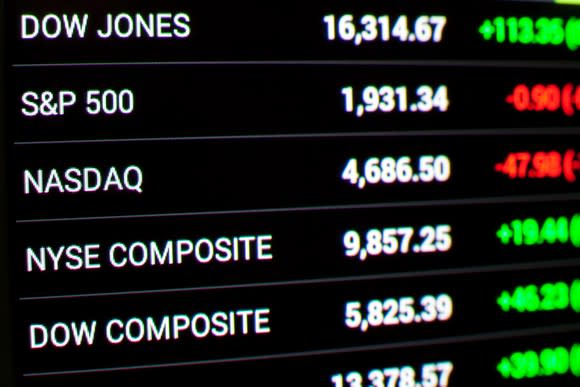The Dow Jones Industrial Average Is a Joke of an Index, and Here's the Data to Prove It
For 121 years, the Dow Jones Industrial Average (DJINDICES: ^DJI) has arguably been the world's most followed stock index. After all, it's the second-oldest stock market index behind the Dow Transportation Index, which shares the name of its creator, Charles Dow.
Composed of 30 multinational companies that often have market caps in excess of $100 billion, the Dow is designed to give investors some sense of how well or poorly the U.S. economy is performing. Meanwhile, occasional changes to the index, which see companies that no longer have as much influence swapped out for larger or more important companies to the U.S. economy, are intended to keep it fresh and relevant.

Image source: Getty Images.
Here's what's wrong with the Dow
However, it's my opinion that no amount of changes to the Dow Jones are going to keep it a relevant index for the average investor. It's an archaic measure of stock market performance that's only kept around because Wall Street likes its novelty. In reality, investors should no longer rely on the Dow to give an accurate picture of market performance -- and I have the data to show why.
Over the past five months, Dow component General Electric (NYSE: GE) has hit the skids. The industrial conglomerate has seen its profit estimates slashed amid the announcement that it's planning to reorganize its business. GE plans to focus on just three core businesses -- power, aviation, and healthcare -- while reducing exposure elsewhere. That also means slashing its dividend in half to conserve capital -- only its third dividend cut since 1899 -- and cutting jobs in the process to reduce costs.
Between June 20 and Nov. 20, 2017, GE shares lost $10.15, translating to 36% of their value, or $88 billion in market cap. But because the Dow Jones Industrial Average is a point-based index rather than a market cap-weighted index, the $10.15 drop in GE's stock that shaved off $88 billion only wound up pushing the Dow down by 69.89 points. That's roughly 0.3%, based on the Dow divisor of 0.14523396877348, according to The Wall Street Journal.

Image source: Getty Images.
By comparison, aircraft manufacturer Boeing (NYSE: BA) has seen its share price increase from a close of $254.09 on Oct. 3 to $264.63 as of Nov. 20. This $10.54 move higher equates to less than $6.3 billion in added market cap for Boeing, but it translates into 72.57 Dow points. In other words, Boeing, which still has a smaller market cap than GE even after its 36% dive, gained just 4.1% ($6.27 billion in market cap) and was able to more than offset the move lower in GE. That's not good.
Want more proof? The five Dow components with the highest share prices -- Boeing, Goldman Sachs, 3M, UnitedHealth Group, and Home Depot -- combine for nearly 7,677 Dow points. Basically, these five stocks make up a third of the index. On the other hand, the five Dow components with the lowest share prices -- GE, Pfizer, Cisco Systems, Intel, and Coca-Cola -- combine to account for just 1,239 Dow points, or a bit over 5%.
But here's the kicker: These bottom-five share-price companies have a combined market cap of $959.6 billion. The Dow components with the highest share prices have a combined market cap of just $791.8 billion, yet they have over six times the influence.
But wait -- there's more
I wish I could say the Dow's reliance on points rather than market-cap weighting is its only flaw, but it's not.
The Dow also fails to accurately reflect certain industries and sectors of the market. In particular, as the name suggests, it's heavily weighted toward industrials, while offering no representation to the utility sector or real estate industry. Comparatively, you'll get that representation by monitoring the broad-based S&P; 500 (SNPINDEX: ^GSPC), which tracks a tad over 500 different stocks in a market-cap weighted index.

Image source: Getty Images.
The Dow also excludes some of the biggest companies in the world, since it consists of only 30 companies. Alphabet, the parent of Google and YouTube, isn't found in the Dow despite being the second-largest company by market cap behind Apple. Also missing in action are Amazon.com (NASDAQ: AMZN), Facebook, Alibaba, and Berkshire Hathaway. Just two of the seven largest companies listed in the U.S. by market cap are in the Dow.
And don't look for any of these names to be added soon, either. For example, Amazon's $1,126.31 price per share would wreak havoc on the Dow's formula. It alone would control more than a third of the index. Less than a 0.1% move up or down in Amazon's share price would more than offset a nearly 6% move in GE's shares.
Ultimately, the Dow is a novelty index. It's fun to dust off from time to time to show your friends, children, and grandchildren how things worked before the internet made content accessible to everyone. What it isn't is a viable index that's going to track the performance of your portfolio or give you an accurate representation of the health of the U.S. economy or stock market. If you want a reputable index that'll give you those things, you should be closely monitoring the S&P 500.
More From The Motley Fool
6 Years Later, 6 Charts That Show How Far Apple, Inc. Has Come Since Steve Jobs' Passing
Why You're Smart to Buy Shopify Inc. (US) -- Despite Citron's Report
John Mackey, CEO of Whole Foods Market, an Amazon subsidiary, is a member of The Motley Fool's board of directors. Suzanne Frey, an executive at Alphabet, is a member of The Motley Fool's board of directors. Sean Williams has no position in any of the stocks mentioned. The Motley Fool owns shares of and recommends Alphabet (A shares), Alphabet (C shares), Amazon, Apple, Berkshire Hathaway (B shares), and Facebook. The Motley Fool has the following options: long January 2020 $150 calls on Apple, short January 2020 $155 calls on Apple, short January 2018 $170 calls on Home Depot, and long January 2020 $110 calls on Home Depot. The Motley Fool recommends 3M, Cisco Systems, Home Depot, Intel, and UnitedHealth Group. The Motley Fool has a disclosure policy.

 Yahoo Finance
Yahoo Finance 